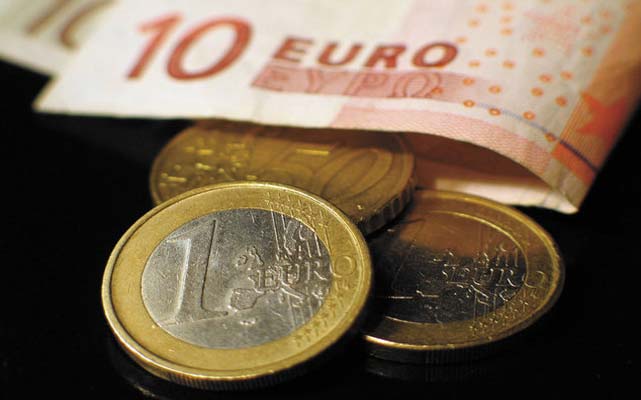Pound-to-Euro Forecast: GBP Slides to 8-Week Lows on UK PMI Weakness
- Written by
David Woodsmith

The British Pound moved lower against the Euro on Tuesday as weak UK PMI business confidence data dragged GBP/EUR exchange rate to fresh eight-week lows near 1.1440.
The latest figures showed a broad slowdown in manufacturing and services, fuelling speculation of a near-term Bank of England rate cut.
By contrast, Eurozone data painted a more mixed picture, with stronger German services offsetting French weakness.
The Pound Sterling attempted to recover in early Europe on Tuesday before sliding again as the latest business confidence data triggered renewed concerns over the economy and is liable to trigger fresh talk of a near-term Bank of England rate cut.
The Pound to Euro exchange rate (GBP/EUR) dipped to 8-week lows below 1.1440 and close to July lows just below 1.1420.
The UK PMI manufacturing index retreated further to a 5-month low of 46.2 for September from 47.0 previously and below consensus forecasts of 47.1.
The services-sector index also retreated to a 2-month low of 51.9 from 54.2 for August and well below expectations of 53.5.
Employment continued to decline while business confidence dipped to a 3-month low.
There was further strong upward pressure on costs, although services charges increased at a slower rate.
According to Chris Williamson, Chief Business Economist at S&P Global Market Intelligence; “September’s flash UK PMI survey brought a litany of worrying news including weakening growth, slumping overseas trade, worsening business confidence and further steep job losses.”
He added; “alarm bells should be ringing that the economy is faltering, which could help shift the policy debate at the Bank of England back towards a more dovish stance.”
Weak growth would increase upward pressure on budget deficits and further erode the government’s fiscal headroom.
Rabobank commented; “In short, tax hikes are pretty much unavoidable. That will be a tough message to sell, as Labour is already trailing Reform in the polls. But investors require something more tangible than just rhetoric: they demand to see credible and substantial fiscal adjustments.”
The Euro-Zone PMI manufacturing index retreated to a 3-month low of 49.5 for September from 50.7 previously and below consensus forecasts of no change.
The services-sector, however, strengthened to a 9-month high of 51.4 from 50.5 and above expectations of 50.6.
There was notable divergence between Germany and France with both French indices in contraction territory while there was a strong rebound in the German services sector.
Dr. Cyrus de la Rubia, Chief Economist at Hamburg Commercial Bank commented; “The eurozone is still on a growth path. That said, we’re still a long way from seeing any real momentum.”
Output prices increased at the slowest rate of the year.
He added; “Selling prices have cooled more noticeably, which might just prompt the ECB to consider whether a rate cut before year’s end could be back on the table.”
Danske Bank does not back further cuts; “In our view, the likelihood of further rate cuts from the ECB has declined further over the past month. We thus expect the key policy rate to remain at 2% until the end of 2026.”
STORY LINK Pound-to-Euro Forecast: GBP Slides to 8-Week Lows on UK PMI Weakness

The British Pound moved lower against the Euro on Tuesday as weak UK PMI business confidence data dragged GBP/EUR exchange rate to fresh eight-week lows near 1.1440.
The latest figures showed a broad slowdown in manufacturing and services, fuelling speculation of a near-term Bank of England rate cut.
By contrast, Eurozone data painted a more mixed picture, with stronger German services offsetting French weakness.
GBP/EUR Forecasts: Slide to 8-Week Lows
The Pound Sterling attempted to recover in early Europe on Tuesday before sliding again as the latest business confidence data triggered renewed concerns over the economy and is liable to trigger fresh talk of a near-term Bank of England rate cut.
The Pound to Euro exchange rate (GBP/EUR) dipped to 8-week lows below 1.1440 and close to July lows just below 1.1420.
The UK PMI manufacturing index retreated further to a 5-month low of 46.2 for September from 47.0 previously and below consensus forecasts of 47.1.
Save on Your GBP/EUR Transfer
Get better rates and lower fees on your next international money transfer. Compare TorFX with top UK banks in seconds and see how much you could save.
Employment continued to decline while business confidence dipped to a 3-month low.
There was further strong upward pressure on costs, although services charges increased at a slower rate.
According to Chris Williamson, Chief Business Economist at S&P Global Market Intelligence; “September’s flash UK PMI survey brought a litany of worrying news including weakening growth, slumping overseas trade, worsening business confidence and further steep job losses.”
He added; “alarm bells should be ringing that the economy is faltering, which could help shift the policy debate at the Bank of England back towards a more dovish stance.”
Weak growth would increase upward pressure on budget deficits and further erode the government’s fiscal headroom.
Rabobank commented; “In short, tax hikes are pretty much unavoidable. That will be a tough message to sell, as Labour is already trailing Reform in the polls. But investors require something more tangible than just rhetoric: they demand to see credible and substantial fiscal adjustments.”
The Euro-Zone PMI manufacturing index retreated to a 3-month low of 49.5 for September from 50.7 previously and below consensus forecasts of no change.
The services-sector, however, strengthened to a 9-month high of 51.4 from 50.5 and above expectations of 50.6.
There was notable divergence between Germany and France with both French indices in contraction territory while there was a strong rebound in the German services sector.
Dr. Cyrus de la Rubia, Chief Economist at Hamburg Commercial Bank commented; “The eurozone is still on a growth path. That said, we’re still a long way from seeing any real momentum.”
Output prices increased at the slowest rate of the year.
He added; “Selling prices have cooled more noticeably, which might just prompt the ECB to consider whether a rate cut before year’s end could be back on the table.”
Danske Bank does not back further cuts; “In our view, the likelihood of further rate cuts from the ECB has declined further over the past month. We thus expect the key policy rate to remain at 2% until the end of 2026.”
International Money Transfer? Ask our resident FX expert a money transfer question or try John's new, free, no-obligation personal service! ,where he helps every step of the way, ensuring you get the best exchange rates on your currency requirements.
TAGS: Pound Euro Forecasts
Comments are currrently disabled
Related Stories:
- Pound-to-Euro Under Pressure as UK Economy Stalls - November 13, 2025
- Pound-to-Euro News, Forecast: GBP Dips, Recovers on UK GDP Miss - November 13, 2025
- Pound to Euro Soft Amid UK Political Worries - November 12, 2025
- British Pound to Euro Forecast: GBP/EUR Slides to 1.1350 on Final 2025 BoE Rate Cut Bets - November 12, 2025
- Pound-to-Euro Mid-Week Forecast: GBP Falls as Labour Market Cools - November 11, 2025
- Pound-to-Euro Forecast: GBP/EUR Steady as Labour Data Looms - November 10, 2025
- British Pound to Euro Forecast: GBP/EUR Capped Below 1.1400 - November 10, 2025
- Pound-to-Euro Week Ahead Forecast: Analysts Predict Drop to 1.11 in 2026 - November 10, 2025
- Pound-to-Euro Forecast: Analysts Eye 1.12 in 6-12 Months - November 7, 2025
Latest News:
- GBP/USD FX Forecast: Pound Sterling Rises Despite Weak UK GDP - November 13, 2025
- Pound-to-Euro Under Pressure as UK Economy Stalls - November 13, 2025
- British Pound to Dollar Forecast: GBP/USD Slips to 1.31 After Weak UK GDP - November 13, 2025
- Pound-to-Euro News, Forecast: GBP Dips, Recovers on UK GDP Miss - November 13, 2025
- GBP to USD Price Forecast: Pound Sterling Tumbles to 1.31 Amid Political Jitters - November 12, 2025
- Pound to Euro Soft Amid UK Political Worries - November 12, 2025
- Euro to Dollar Rate Forecast: EUR/USD Needs "Softer Data" for 1.16+ - November 12, 2025
- Pound-to-Dollar Forecast: GBP/USD Recovery Halts on Dovish BoE Outlook - November 12, 2025
- British Pound to Euro Forecast: GBP/EUR Slides to 1.1350 on Final 2025 BoE Rate Cut Bets - November 12, 2025
- GBP/USD Forecast: Pound Sterling Under Pressure as BoE Cut Expectations Grow - November 11, 2025









